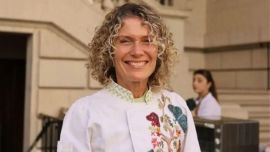In these times of fake news honour might seem almost as outdated among journalists as pens (despite the recent vice-presidential highlighting of that implement) yet the three Pluma de Honor prizes awarded by the National Press Academy on Journalists’ Day last Tuesday were all richly deserved in their different ways – even if the hearts of this newspaper are obviously closest to Robert Cox as the successors of his Buenos Aires Herald.
In any event Cox led the way chronologically at least as the winner of the 2020 prize for excellence, followed by Elisabetta Piqué (2021) and Daniel Enz (2022) – catching up with a backlog of three years due to the coronavirus pandemic, as explained by Academy president Joaquín Morales Solá. The latter began by asking: “What can be said about Robert Cox which has not already been said?” prompting the former Herald editor to start heading for the podium to deliver his acceptance speech, only to be halted by a “Momento!” from a Morales Solá far from finished with his praise.
Citing Cox’s basic principle as “Journalism is free or it does not exist,” the Academy president described him as an extraordinary editor accompanying words with action – arrested and then exiled by the 1976-1983 military dictatorship for denouncing its violations of human rights, Cox’s stance placed him among the journalists poised between life and death. This defence of human rights obviously forms the central part of anything ever said or written about Cox but Morales Solá added a couple of other merits – converting the community newspaper he entered in 1959 into a journal of political reference for other media ever since and serving as the 2001-2002 president of the Inter-American Press Association (SIP in its Spanish acronym).
Accepting the prize awarded since 2008 as a recognition of all who worked at the Herald and in the name of the journalists who went missing rather than for himself, Cox began by saying: “In Argentina we know what happens when there is no journalism,” as was the case in 1976 with the silence of the press creating a vacuum which his newspaper sought to fill by informing the world about the atrocities of state terrorism. He compared the press response to “a bid to change Argentina” by defending human rights to the far more recent response of the United States press to defend democracy from the challenge of Donald Trump. We need to look at the past to learn from it, he concluded.
Described by Morales Solá as another journalist at the border between life and death as one of that special breed of war correspondents (in a career throughout this century beginning with Afghanistan and most recently the first seven weeks of the Russian invasion of Ukraine), La Nación’s Piqué said that she had always wanted to be a war correspondent ever since she was a little girl, always preferring trenches to beaches. Describing truth as the first casualty of war in an era of fake news, she deplored a Ukraine war entering its 104th day that Tuesday with its destruction of homes and lives, dedicating her prize and Journalist’s Day to the journalists who had perished or gone missing in that conflict (some of whom had joined up).
Daniel Enz, the author of 16 books and founder of the critical magazine Análisis (which started in 1990 with two chairs and one typewriter), whose three decades of crusading against drugs and graft in Entre Ríos were recently crowned with the conviction of former two-term governor Sergio Urribarri, was presented by Morales Solá as the most important inland investigative journalist in Argentina.
Enz endorsed Morales Solá’s words as to the intensity of the work involved in corruption probes with no margin for error due to the loss of credibility. Starting with public works corruption, Enz moved onto crooked politicians, perverted priests and narcos in an everyday battle against graft and drug-trafficking whose reward was litigation, debts and threats leading to police bodyguards outside his house. Despite which he concluded: “We have to denounce power and look after the neediest. We still love journalism, discovering hidden stories. We are journalists and proud of it.”





















Comments